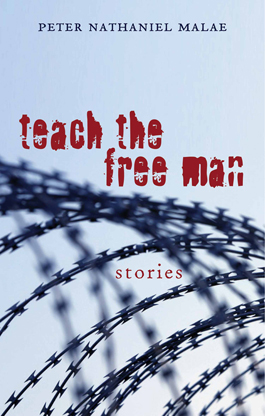home | metro silicon valley index | the arts | books | review

Prison Pages
Local author Peter Malae writes about life behind bars
By Karen Laws
"I HAVE hard time with laudations," says Santa Clara author Peter Nathaniel Malae when asked about being a finalist for the prestigious Young Lions Fiction Award, which will be announced at the end of the month. Given each spring by the New York Public Library to a writer under the age of 35, the award honors fiction that has made an "indelible impression on the world of literature." Not too shabby for a guy who dropped out of four different colleges, finally leaving San Jose State University just 20 units shy of graduating so that he would have more time to write. Malae grew up in Santa Clara and San Jose, where he attended an all-boys' parochial high school. The 12 stories in Teach the Free Man are set in a very different kind of all-boys' institution: California state prison.
If prisons have walls and fences topped by razor wire, you'd hardly know it from reading this debut collection. Rather than physical descriptions of San Quentin and other penal landmarks, readers will find brilliant psychological portraits of convicts, ex-cons, their families and prison workers. The real prison, Malae suggests, is the "institutional me-tracked mind."
While the first story, "Turning Point," may strike readers as misogynistic, Malae typically shows great pathos and sensitivity in portraying human relationships. Stories such as "Before High Desert" require us to parse conversations as if we were overhearing them from a neighboring cell, paying attention to the feeling behind the words:
"Reg," said Ya-Ya.
"Wassup?"
"I'm out, homie."
"Where?"
"High Desert. Level IV."
Regulator rolled over. "Sweet Jesus."
"I'll drop you a kite, Reg."
"The Arms of Brian Flintcraft," the longest and most powerful story in the collection, reminds us that racial tensions are a constant of prison life. On young Brian's first day, he notices that the convicts sort themselves by color as they take their seats in the cafeteria. Our sympathy for this 17-year-old newbie turns to horror as we see him make fantastically poor choices. The story's realism is never compromised, however, because every swing of Brian's fist is true to his character. He's an angry, reactive man with the instincts of a killer.
"Prison gon' reduce you, boy," remarks a man who, under California's three-strikes law, is serving 25 to life for petty theft. Although at times Malae's pared-down style lapses into mere sketching, his best stories not only describe a downward trajectory but bring to life characters giving full expression to desires most of us have learned to keep in check. As the reader enters into the protagonist's mind and heart (typically swarming with private demons), a funny thing happens; the invisible walls that separate people according to race, class, and gender start to dissolve—not in the text—but in our minds as we read.
"Reliable Vet Dad, Reliable Con Son" interweaves two stories on the theme of retribution. Only gradually do we realize that the son has spent the last eight months in solitary confinement and that his father has come to see him on the first day he can have visitors again. Malae's willingness to experiment with form extends to the rarely used second-person narrator in "What You Can Do After Shutdown," a story that weighs possibilities for doing time creatively (decorate your cell with breakfast gravy, for example) against the dangerous allure of suicide. Functioning as a kind of back-roads tour guide to incarceration, Malae shares fascinating tips such as how to smuggle dope in your jheri curls. At least one California prison contains a chicken farm—who knew? But the real excitement of reading this book comes from getting inside the heads of characters such as Brian Flintcraft.
A footloose young man who's never seen the inside of a prison is the protagonist of Malae's first novel, not yet in print. (The Jackson Award–winning manuscript is currently being read by the president of a New York publishing firm.) Malae has also written a book of poetry and is now working on "an epic novel about an American family in the '50s." This is a writer to keep on your literary radar screen.
TEACH THE FREE MAN, by Peter Nathaniel Malae, Swallow Press/Ohio University Press; 258 pages, $28.95 hardback, $16.95 paper. Karen Laws is a member of Northern California Book Reviewers.
Send a letter to the editor about this story.
|
|
|
|
|
|